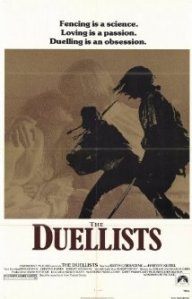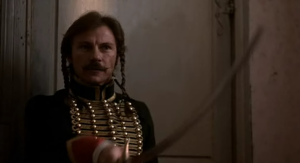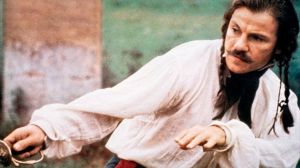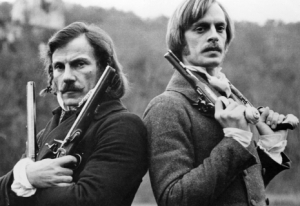 I have recently decided to re-watch all of Ridley Scott’s directorial efforts from the beginning, which will include the few of his movies that I haven’t yet seen.
I have recently decided to re-watch all of Ridley Scott’s directorial efforts from the beginning, which will include the few of his movies that I haven’t yet seen.
The Duellists is one of those movies. It has been on my radar for a long while, specifically because of my love of sword play in movies. I often say that if a movie has a sword in it, I will probably go to see it in the theatre.
Last night I had the pleasure of watching Ridley Scott’s first cinematic effort, and I was quite pleased. Set during the Napoleonic era, beginning in the year 1800, it follows the path of two Hussars, D’Hubert (played by Keith Carradine) and Feraud (played by Harvey Keitel).
Feraud is a man on the surface consumed by honour, a man who duels at the slightest provocation, but this is masking some inward wound that is never revealed. His mind will twist any behaviour into an insult against his honour, which requires him to respond. His human connections are slight over the course of his life, the steadiest being the man who acts as his second. But as far as relationships, he is cold, and unresponsive.
D’Hubert is a moral man. He too is bound by honour, but he is not blinded by it. Over the course of the movie he suffers many setbacks because of his service to honour, but he does not use them as an excuse, nor shift the blame. He is a man who at his heart is much moved by love, and can be tender and introspective. He makes a number of overtures to Feraud, willing to let the matter lie, but Feraud will not accept any result but the death of one party or the other.
The action of the movie begins in 1800 in Strasbourg, when Feraud kills the son of the mayor in a duel, and D’Hubert is sent to arrest Feraud. Feraud happens to be in the house of a madam at the time, though it seems he is not servicing physical desires, he seems to be there to enjoy a musical performance, one of the few hints at human emotion we are shown regarding Feraud.
Feraud and D’Hubert end up fighting, D’Hubert being reluctant as he has little reason to fight, but Feraud is overwhelming in his insistence. The duel ends in a draw, as Feraud’s housekeeper interferes and the fight cannot continue. D’Hubert is dismissed from his post on the General’s staff back into regular service for his role, which he does not protest.
Thus begins the narrative backbone of the movie, which is episodic, the two soldiers meeting at various points along the paths of their lives, always ending up fighting each other. The widely disparate duels are bridged by voice over narration by Stacey Keach, which works surprisingly well in this movie, you are kept in place, even though you are jumping in time and physical space. Even so, I found the pacing a bit awkward, but I don’t believe there was much alternative – the movie is just under two hours long, and to film all the connecting bits which really are not of much importance to the overall drive of the story, would result in a movie that was overlong and glacial in its pacing.
The duels are fantastic, choreographed by William Hobbs, who also choreographed the 70’s Musketeer movies, Excalibur, Ladyhawke, Rob Roy, etc. (yes, almost every movie with a sword in it, it seems). Fantastic. Usually they fight with sabers, which is wonderful. Usually as in the Musketeer movies the actors are fencing with Rapiers, and I prefer the heavier sword, not seen as often in film.
The cinematography is lush, influence by Kubrick’s Barry Lyndon. The film was shot, out of necessity, entirely on location, so the buildings look fantastic, as they are all real.
Keith Carradine is marvelous in this picture. I already liked him as an actor, but this movie made my respect for him increase dramatically. Keitel is very fine as well in his role, something very different than he is usually seen in, but he embodies his role perfectly.
This is the first major movie of Pete Postlethwaite, who was always a fine, fine character actor. Also of note are Tom Conti, Alun Armstrong, and Albert Finney, among others, all uniformly excellent.




